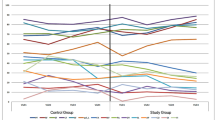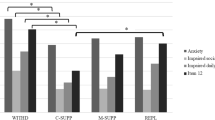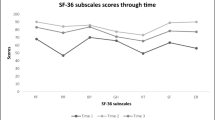Abstract
Context
To prepare for radioactive iodine therapy in post total thyroidectomy patients with well-differentiated thyroid cancer (WDTC), either thyroid hormone withdrawal (THW) or administration of recombinant human thyrotropin (rhTSH) can be performed.
Objective
Our objective is to compare quality of life (QoL) parameters using the SF-36v2 questionnaire (Short Form health survey) and a self-evaluated item, and the hypothyroid status using modified Billewicz scores in an Asian population undergoing either THW or rhTSH for remnant ablation or adjuvant treatment following total thyroidectomy for WDTC. We will also assess the proportion of patients achieving TSH level of >30 mU/L after 4 weeks of thyroid hormone withdrawal.
Results
Patients in the rhTSH group were better in the QoL domains of physical functioning, role functioning/physical and bodily pain, while patients in THW group were better in mental health. This was however, not statistically significant. Modified Billewicz scores were higher in patients in THW group as compared with rhTSH group and statistically significant. A total of 96.3% of patients achieved TSH level >30 mU/L after 4 weeks of THW.
Conclusion
Clinical symptoms and signs of hypothyroidism as assessed with modified Billewicz scores were statistically significantly higher in the THW group. However, there was no statistically significant difference in QoL in the rhTSH group.
Similar content being viewed by others
References
National Cancer Institute. SEER Cancer Stat Facts: Thyroid Cancer. (National Cancer Institute, Bethesda, MD, 2019)
J.D. Lin, T.C. Chao, M.J. Huang, H.F. Weng, K.Y. Tzen, Use of radioactive iodine for thyroid remnant ablation in well-differentiated thyroid carcinoma to replace thyroid reoperation. Am. J. Clin. Oncol. 21, 77–81 (1998)
R.M. Tuttle et al. Controversies, consensus, and collaboration in the use of 131I therapy in differentiated thyroid cancer: a joint statement from the American Thyroid Association, the European Association of Nuclear Medicine, the Society of Nuclear Medicine and Molecular Imaging, and the European Thyroid Association. Thyroid 29, 461–470 (2019)
B.R. Haugen et al. 2015 American thyroid association management guidelines for adult patients with thyroid nodules and differentiated thyroid cancer: the American thyroid association guidelines task force on thyroid nodules and differentiated thyroid cancer. Thyroid 26, 1–133 (2016)
J. Lee et al. Quality of life and effectiveness comparisons of thyroxine withdrawal, triiodothyronine withdrawal, and recombinant thyroid-stimulating hormone administration for low-dose radioiodine remnant ablation of differentiated thyroid carcinoma. Thyroid 20, 173–179 (2010)
P.R. Schroeder et al. A comparison of short-term changes in health-related quality of life in thyroid carcinoma patients undergoing diagnostic evaluation with recombinant human thyrotropin compared with thyroid hormone withdrawal. J. Clin. Endocrinol. Metab. 91, 878–884 (2006)
K.H. Dow, B.R. Ferrell, C. Anello, Quality-of-life changes in patients with thyroid cancer after withdrawal of thyroid hormone therapy. Thyroid 7, 613–619 (1997)
M. Luster, R. Felbinger, M. Dietlein, C. Reiners, Thyroid hormone withdrawal in patients with differentiated thyroid carcinoma: a one hundred thirty-patient pilot survey on consequences of hypothyroidism and a pharmacoeconomic comparison to recombinant thyrotropin administration. Thyroid 15, 1147–1155 (2005)
G.A. Lupoli et al. An easy schedule for postsurgical radioiodine administration in newly diagnosed differentiated thyroid carcinoma patients. Clin. Endocrinol. 78, 145–151 (2013)
R.J. Robbins, A. Driedger, J. Magner; U.S. and Canadian Thyrogen Compassionate Use Program Investigator Group., Recombinant human thyrotropin-assisted radioiodine therapy for patients with metastatic thyroid cancer who could not elevate endogenous thyrotropin or be withdrawn from thyroxine. Thyroid 16, 1121–1130 (2006)
C. Jenkinson, A. Coulter, L. Wright, Short form 36 (SF36) health survey questionnaire: normative data for adults of working age. BMJ 306, 1437–1440 (1993)
W.Z. Billewicz et al. Statistical methods applied to the diagnosis of hypothyroidism. Q. J. Med. 38, 255–266 (1969)
B. Nygaard, L. Bastholt, F.N. Bennedbæk, T.W. Klausen, J. Bentzen, A placebo-controlled, blinded and randomised study on the effects of recombinant human thyrotropin on quality of life in the treatment of thyroid cancer. Eur. Thyroid J. 2, 195–202 (2013)
R.M. Wolfson et al. Recombinant human thyroid stimulating hormone versus thyroid hormone withdrawal for radioactive iodine treatment of differentiated thyroid cancer with nodal metastatic disease. J. Oncol. 2016, 6496750 (2016)
R.K. Orosco et al. Analysis of age and disease status as predictors of thyroid cancer-specific mortality using the surveillance, epidemiology, and end results database. Thyroid 25, 125–132 (2015)
R. Rahbari, L. Zhang, E. Kebebew, Thyroid cancer gender disparity. Future Oncol. 6, 1771–1779 (2010)
F. Pacini et al. Radioiodine ablation of thyroid remnants after preparation with recombinant human thyrotropin in differentiated thyroid carcinoma: results of an international, randomized, controlled study. J. Clin. Endocrinol. Metab. 91, 926–932 (2006)
S. Tagay et al. Health-related quality of life, anxiety and depression in thyroid cancer patients under short-term hypothyroidism and TSH-suppressive levothyroxine treatment. Eur. J. Endocrinol. 153, 755–763 (2005)
L.A. Valle et al. In thyroidectomized patients with thyroid cancer, a serum thyrotropin of 30 μU/mL after thyroxine withdrawal is not always adequate for detecting an elevated stimulated serum thyroglobulin. Thyroid 23, 185–193 (2013)
C.J. Edmonds, S. Hayes, J.C. Kermode, B.D. Thompson, Measurement of serum TSH and thyroid hormones in the management of treatment of thyroid carcinoma with radioiodine. Br. J. Radiol. 50, 799–807 (1977)
A. Piccardo et al. Could short thyroid hormone withdrawal be an effective strategy for radioiodine remnant ablation in differentiated thyroid cancer patients? Eur. J. Nucl. Med. Mol. Imaging 45, 1218–1223 (2018)
Acknowledgements
Sanofi was involved in the protocol development, study execution, data collection and analysis. Sanofi also provided funding for the research coordinators involved in the study. There was however no funding for Thyrogen®, this was borne by the patients.
Author information
Authors and Affiliations
Corresponding author
Ethics declarations
Conflict of interest
The authors declare that they have no conflict of interest.
Additional information
Publisher’s note Springer Nature remains neutral with regard to jurisdictional claims in published maps and institutional affiliations.
Rights and permissions
About this article
Cite this article
Tang, C.Y.L., Thang, S.P., Zaheer, S. et al. Recombinant human thyrotropin versus thyroid hormone withdrawal in an Asian population. Endocrine 69, 126–132 (2020). https://doi.org/10.1007/s12020-020-02238-z
Received:
Accepted:
Published:
Issue Date:
DOI: https://doi.org/10.1007/s12020-020-02238-z




